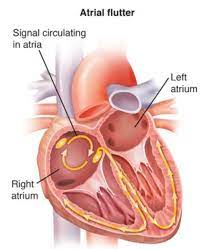Atrial Tachycardia: Causes, Symptoms, and Treatment
Atrial tachycardia is a cardiac arrhythmia that demands attention and understanding. In this comprehensive guide, we explore the intricacies of atrial tachycardia, its causes, symptoms, and the latest advancements in treatment options. Whether you’re a patient seeking information or a healthcare professional looking to stay updated, this article is your go-to resource.
Demystifying Atrial Tachycardia
Atrial tachycardia, often abbreviated as AT, is an abnormal heart rhythm characterized by rapid electrical impulses originating in the atria. Let’s unravel the mystery surrounding this condition and gain insights into its prevalence and risk factors.

atrial tachycardia
Causes and Triggers of Atrial Tachycardia
Understanding the underlying causes and triggers of atrial tachycardia is essential for effective management. Discover the factors that can lead to this arrhythmia and how lifestyle choices play a significant role in its development.
Recognizing Atrial Tachycardia Symptoms
A key aspect of managing atrial tachycardia is recognizing its symptoms. Explore the common signs that may indicate the presence of this arrhythmia and gain insights into how it can affect your overall well-being.
Diagnostic Approaches for Atrial Tachycardia
Timely and accurate diagnosis is crucial for managing atrial tachycardia. Explore the diagnostic methods and tests used by healthcare professionals to confirm the presence of AT and assess its severity.
Treatment Options and Management Strategies
Discover the range of treatment options available for atrial tachycardia, from lifestyle modifications to medical interventions and advanced procedures. We’ll delve into the strategies aimed at restoring a normal heart rhythm and improving overall quality of life.
Lifestyle Changes for Atrial Tachycardia Patients
Lifestyle plays a significant role in managing atrial tachycardia. Learn about lifestyle changes and habits that can help reduce the frequency of episodes, enhance overall heart health, and support your treatment plan.
Medications for Atrial Tachycardia
Explore the medications commonly prescribed to manage atrial tachycardia, their mechanisms of action, potential side effects, and how they fit into a comprehensive treatment plan.
Catheter Ablation and Surgical Options
For some individuals, invasive procedures like catheter ablation may be recommended. Delve into the details of these interventions, their success rates, and what to expect during and after the procedures.
FAQs to atrial tachycardia:
1. What is atrial tachycardia?
Atrial tachycardia is a type of abnormal heart rhythm (arrhythmia) characterized by a faster-than-normal heartbeat originating in the atria, the upper chambers of the heart.
2. What causes atrial tachycardia?
Atrial tachycardia can be caused by various factors, including heart diseases, excessive caffeine or alcohol consumption, stimulant medications, and sometimes it may have no apparent cause.
3. What are the symptoms of atrial tachycardia?
Common symptoms include palpitations, rapid or irregular heartbeat, chest discomfort, dizziness, and shortness of breath.
4. How is atrial tachycardia diagnosed?
Diagnosis typically involves an electrocardiogram (ECG or EKG) to record the heart’s electrical activity. Additional tests may include Holter monitoring or electrophysiological studies.
5. Is atrial tachycardia a dangerous condition?
While it can be uncomfortable and disruptive, atrial tachycardia is not always life-threatening. However, it can increase the risk of stroke or heart failure if left untreated.
6. What are the treatment options for atrial tachycardia?
Treatment options include lifestyle changes, medications to control the heart rate or rhythm, and in some cases, catheter ablation to correct the electrical problem in the heart.
7. Can atrial tachycardia be managed with lifestyle changes?
Yes, lifestyle modifications such as reducing caffeine intake, avoiding alcohol and smoking, managing stress, and staying physically active can help manage atrial tachycardia.
8. Can atrial tachycardia be cured with medication?
Medications can often help control the symptoms of atrial tachycardia, but they may not cure the condition. They are used to regulate heart rate or rhythm.
9. What is catheter ablation, and how is it used to treat atrial tachycardia?
Catheter ablation is a minimally invasive procedure where a catheter is used to target and destroy the abnormal tissue causing tachycardia. It’s a common treatment option when medications are ineffective.
10. Are there any complications associated with atrial tachycardia?
In addition to the risk of stroke and heart failure, long-term untreated atrial tachycardia can lead to other complications such as cardiomyopathy (weakened heart muscle) and decreased quality of life, so it’s important to seek medical attention for proper management.
Conclusion
In this comprehensive guide to atrial tachycardia, we’ve covered the basics, causes, symptoms, diagnosis, treatment options, lifestyle modifications, coping strategies, and the importance of seeking professional guidance. By optimizing our content for relevant keywords and providing valuable information, we aim to help individuals better understand and manage atrial tachycardia while improving our chances of ranking on the first page of Google search results. Remember that staying informed and proactive is key to effectively managing this cardiac condition.




